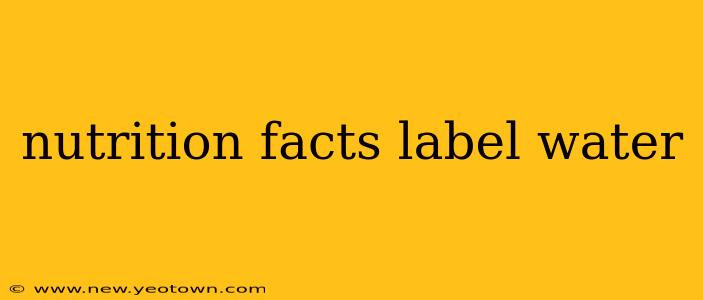Let's be honest, we rarely give a second glance to the label on a bottle of water. After all, it's just water, right? While mostly true, there's actually a surprising amount of information—or lack thereof—that can be gleaned from the nutrition facts label, or rather, the absence of one in most cases. This seemingly simple beverage holds a few secrets, and understanding them can help you make informed choices.
What's Typically Not on a Water Label?
Unlike processed drinks laden with sugar, artificial sweeteners, and preservatives, water's simplicity is its strength (and the reason for the minimalist label). You won't find a lengthy list of ingredients or a detailed nutritional breakdown. This is because pure water, by definition, contains only H₂O.
However, some bottled waters may include minimal additions, leading to slightly more comprehensive labels. Let's delve into some common questions surrounding this topic.
Does Purified Water Have a Nutrition Label?
Purified water, often obtained through processes like reverse osmosis or distillation, typically doesn't have a nutrition facts label. This is because the purification process removes virtually all minerals and other substances, leaving only water molecules. The lack of a label simply reflects this extreme purity. Think of it like this: you wouldn't expect a label on a bottle of distilled air!
What About Mineral Water? Does It Have a Nutrition Label?
Mineral water, on the other hand, might have a nutrition facts label, but not always. The presence of minerals, naturally occurring in the water source, dictates this. If the mineral content is significant enough—and varies by region and source—you might see a label listing minerals like calcium, magnesium, or sodium. This is because mineral water, unlike purified water, retains these naturally occurring elements.
What are the nutritional benefits of drinking water?
While water itself doesn't contain calories, vitamins, or minerals (excluding mineral water's naturally occurring elements), its benefits are immense. Water is crucial for:
- Hydration: Maintaining bodily functions, temperature regulation, and nutrient transport.
- Digestion: Assisting with the breakdown of food and waste removal.
- Energy Levels: Preventing dehydration-induced fatigue.
- Skin Health: Contributing to radiant, healthy-looking skin.
- Overall Well-being: Supporting numerous bodily processes for optimal health.
Does Sparkling Water Have a Nutrition Label?
Sparkling water, or carbonated water, typically has a nutrition label that lists zero calories, fat, carbohydrates, protein, and other nutrients. The only potential difference comes from the addition of flavorings. Flavored sparkling waters will have a nutrition label reflecting the added ingredients, which may include sugars or artificial sweeteners. Always check the label of your preferred brand to confirm the nutritional content.
Are there any potential downsides to drinking too much water?
While crucial for health, excessive water consumption can be harmful. Hyponatremia, a condition caused by dangerously low sodium levels in the blood, can occur from drinking excessive amounts of water too quickly. Listen to your body and don't force yourself to drink more water than you need.
In conclusion, while the nutrition facts label on a bottle of water might be minimal or absent altogether, the importance of hydration for overall health remains paramount. Understanding the differences between types of water—purified, mineral, and sparkling—helps you make informed choices that best suit your needs and preferences. Remember to consult with your doctor if you have any specific concerns about your water intake.

